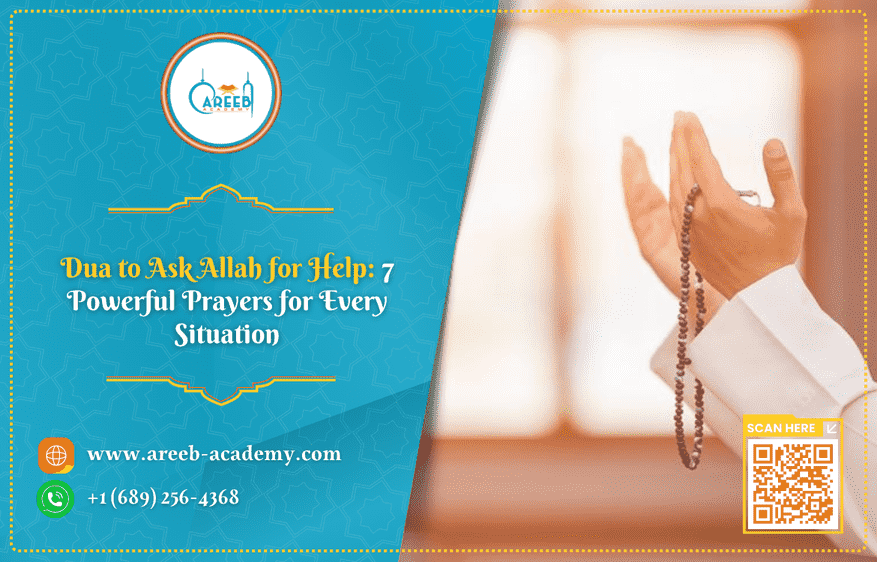
Life is full of challenges, uncertainties, and moments when we feel weak, anxious, or overwhelmed. In such times, turning to Allah becomes our greatest source of strength, comfort, and guidance. Making a dua to ask Allah for help is not merely a ritual—it is a heartfelt conversation with the One who holds all power and wisdom. Through sincere supplication, believers seek relief from worry, clarity in confusion, courage in difficulty, protection from harm, and success in their endeavors.
This article explores the power of turning to Allah in every situation, highlighting key examples from the lives of Prophets Yunus (AS) and Musa (AS), practical tips for making effective dua, the best times to supplicate, and seven powerful prayers that can guide and strengthen you in any circumstance. By understanding and practicing these principles, you can cultivate faith, patience, and a deep connection with Allah, knowing that no challenge is too great when you seek His help with sincerity and trust.
Dua to Ask Allah for Help — Why We Turn to Him

The meaning of seeking help (isti’anah) in Islam
In Islam, seeking help, known as isti’anah, goes far beyond merely asking for assistance—it is a profound acknowledgment of human dependence on Allah. Life is full of trials, tests, and unexpected challenges, and no matter how strong, intelligent, or capable a person may be, there are circumstances that only Allah can ease or resolve. Turning to Him through dua (supplication) — especially a dua to ask Allah for help — is an act of both humility and sincerity, showing complete reliance on His infinite wisdom, power, and mercy.
Through isti’anah, believers recognize that while human effort and planning are important, ultimate success, relief from hardships, and guidance come only from Allah. This practice constantly reminds believers that true support comes only from Allah, not from worldly means like wealth, status, or personal ability. Instead, it is the One who is all-knowing (Al-‘Aleem), all-powerful (Al-Qadeer), and ever-merciful (Ar-Rahman) who holds the ultimate control over every situation.
Moreover, making a dua to ask Allah for help strengthens the heart, instills patience, and nurtures spiritual resilience. It transforms moments of fear, anxiety, or despair into opportunities for deeper faith, reflection, and reliance on the Divine. By consistently turning to Allah in both small and great matters, believers cultivate a close and trusting relationship with Him, knowing that no challenge is too great for His help, and no hardship is without His wisdom and guidance.
Quranic command to rely on Allah alone
The Quran repeatedly emphasizes the importance of turning to Allah for guidance and help. Believers are reminded that ultimate aid and success belong to Him alone. One clear example is the verse:
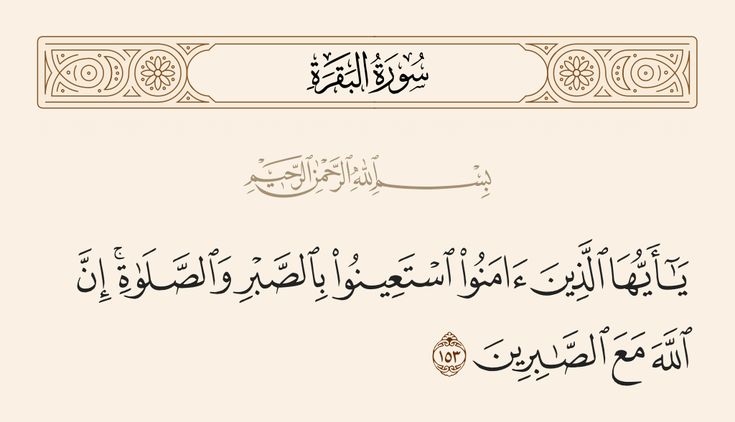
“And seek help through patience and prayer, and indeed, it is difficult except for the humbly submissive.”
Al-Baqarah (2:45)
This verse teaches believers that dua is far more than a simple request; it is a profound spiritual practice that nurtures the heart, strengthens patience, and builds resilience. By seeking Allah’s help, a believer acknowledges their limitations and places complete trust in His wisdom and power.
Moreover, relying on Allah helps believers face life’s challenges with confidence and peace. Even in the hardest moments, His support is always near. It reminds us that no matter how capable we seem, some trials can only be resolved by Him. Through sincere dua to ask Allah for help, the heart connects to the ultimate source of mercy and strength.
The Prophet’s ﷺ example in times of hardship
The Prophet Muhammad ﷺ serves as the perfect example of turning to Allah in every situation. Whether the challenge was great or small, he ﷺ always sought Allah’s guidance and help. Throughout his life — in personal trials, family matters, or community hardships — he ﷺ turned to Allah with sincere supplication. Each heartfelt dua to ask Allah for help reflected his complete trust, humility, and faith in his Lord. His ﷺ life demonstrates patience, reliance, and unwavering faith in Allah’s wisdom and mercy.
Following the Prophet’s ﷺ example teaches believers that no difficulty is insurmountable when approached with heartfelt dua and firm faith. True strength lies not only in human effort but in trusting Allah to guide and provide relief. When believers regularly turn to Him with sincere dua to ask Allah for help, in both joyful and difficult moments, they build a deep and personal connection with their Creator.
This practice nurtures inner peace, strengthens resilience, and equips the heart with the courage to endure life’s tests. Through sincere supplication and remembrance, believers remember that Allah’s support is always near, His mercy is vast, and with Him, they can face even the most overwhelming challenges with confidence and hope.
The Power of Dua to Ask Allah for Help in Difficult Times
In times of hardship, dua becomes a believer’s strongest weapon and greatest comfort. It bridges the gap between human weakness and divine strength, allowing the heart to find peace even amid chaos. Dua reminds us that while challenges are inevitable, despair is not—because Allah is always near, listening and responding in ways that may surpass our understanding.
When a person raises their hands and calls upon Allah sincerely, they acknowledge His supreme power over all matters. This act of surrender transforms pain into patience, fear into faith, and uncertainty into hope. Allah promises in the Qur’an:
وَإِذَا سَأَلَكَ عِبَادِي عَنِّي فَإِنِّي قَرِيبٌ ۖ أُجِيبُ دَعْوَةَ الدَّاعِ إِذَا دَعَانِ
“And when My servants ask you concerning Me—indeed I am near. I respond to the invocation of the supplicant when he calls upon Me.”
Surah (Chapter): Al-Baqarah (2:186)
This verse beautifully assures believers that no dua goes unheard, and no heart that turns to Allah is left abandoned.
How dua to ask Allah for help connects you to Allah
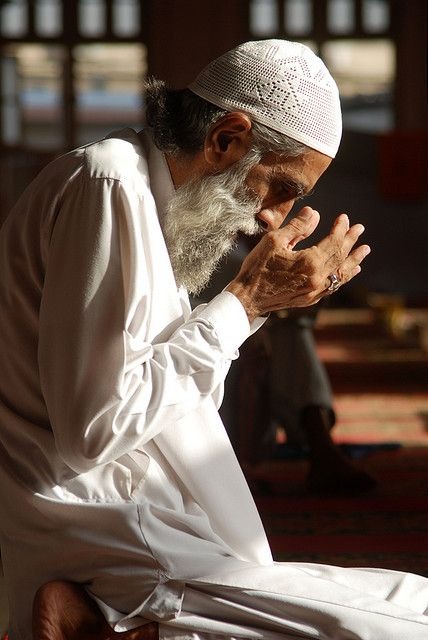
Dua is more than just words—it is a dialogue between the Creator and His servant. It draws the believer closer to Allah, nurturing love, trust, and dependence upon Him. Every time you call upon Allah, you are strengthening that spiritual bond and reminding your heart that you are never alone.
Even when the answer doesn’t come immediately, the act of making dua itself is a mercy. It softens the heart, increases humility, and purifies the soul. The Prophet ﷺ said:
“Dua is worship.” (Tirmidhi)
This hadith emphasizes that turning to Allah is itself an act of devotion and submission. It keeps faith alive and ensures that a believer’s heart remains connected to the One who never disappoints.
The Best Times to Make Dua to Ask Allah for Help
There are many special times when dua (supplication) is more likely to be accepted by Allah ﷻ, as mentioned in the Qur’an and Sunnah. These include:
- The last third of the night, when Allah descends to the lowest heaven and invites believers to ask for what they need.
- Between Adhan and Iqamah, as the Prophet ﷺ said that dua made at this time is not rejected.
- During sujood (prostration), when a person is closest to Allah.
- On Friday, especially the last hour before Maghrib.
- While fasting and at the time of breaking the fast, as the dua of a fasting person is not rejected.
- When it rains, since it is a time of mercy.
- On the Day of Arafah and the Night of Qadr (Laylat al-Qadr), both being blessed occasions when prayers are readily answered.
- When traveling, and when a person is oppressed, as their duas are heard by Allah.
- After obligatory prayers and in the last part of the night, which are moments of closeness to Allah.
- When drinking Zamzam water, while visiting the sick, and when remembering Allah in a gathering, as these moments are filled with blessings.
These times remind believers to stay connected to Allah throughout the day and night, seizing every opportunity to call upon Him with sincerity and trust.
Conditions for dua to be accepted
For a dua to ask Allah for help to be accepted, Islam teaches certain important conditions that help make the supplication sincere and effective:
Call upon Allah alone.
Dua should be directed only to Allah, without any intermediaries or saints. The Prophet ﷺ said:
يَا غُلَامُ! اِحْفَظِ اَللَّهَ يَحْفَظْكَ, اِحْفَظِ اَللَّهَ تَجِدْهُ تُجَاهَكَ, وَإِذَا سَأَلْتَ فَاسْأَلْ اَللَّهَ, وَإِذَا اِسْتَعَنْتَ فَاسْتَعِنْ بِاَللَّهِ } رَوَاهُ اَلتِّرْمِذِيُّ, وَقَالَ: حَسَنٌ صَحِيحٌ. 1 .
O lad, be mindful of Allah and He will protect you. Be mindful of Allah and you shall find Him with you. When you ask (for anything), ask it from Allah, and if you seek help, seek help from Allah. (Tirmidhi, 2516)
Allah also says:
وَأَنَّ ٱلْمَسَـٰجِدَ لِلَّهِ فَلَا تَدْعُوا۟ مَعَ ٱللَّهِ أَحَدًۭا ١٨
“And the mosques are for Allah (alone), so do not invoke anyone along with Allah.” (Al-Jinn 72:18)
A believer should call upon Allah directly, knowing that He hears every prayer without the need for any intercessor.
use lawful means to draw closer to Allah
Seek nearness to Him through good deeds, repentance, and sincere worship — the ways prescribed in the Quran and Sunnah.
Avoid haste.
Sometimes a person’s dua is delayed, but this delay carries wisdom. The Prophet ﷺ said:
يُسْتَجَابُ لأَحَدِكُمْ مَا لَمْ يَعْجَلْ يَقُولُ دَعَوْتُ فَلَمْ يُسْتَجَبْ لِي ”.
“A person’s dua will be answered so long as he is not hasty and says, ‘I prayed but got no response.’” (Bukhari 6340)
Do not make dua for sinful things or to break family ties.
The Prophet ﷺ said:
“A person’s dua may be answered as long as he does not ask for sin or severing kinship.” (Tirmidhi 3604)
Think positively of Allah.
Always believe that Allah hears you and will respond in the best way. The Prophet ﷺ said:
“Allah says: ‘I am as My servant thinks of Me.’” (Bukhari 7405)
Be sincere and focused.
Dua should come from a present, humble heart. The Prophet ﷺ said:
“ ادْعُوا اللَّهَ وَأَنْتُمْ مُوقِنُونَ بِالإِجَابَةِ وَاعْلَمُوا أَنَّ اللَّهَ لاَ يَسْتَجِيبُ دُعَاءً مِنْ قَلْبٍ غَافِلٍ لاَهٍ ”
“Know that Allah does not answer a dua from a distracted heart.” (Tirmidhi 3479)
Avoid aggression in dua.
Ask with humility and respect. Allah says:
ٱدْعُوا۟ رَبَّكُمْ تَضَرُّعًۭا وَخُفْيَةً ۚ إِنَّهُۥ لَا يُحِبُّ ٱلْمُعْتَدِينَ ٥٥
“Invoke your Lord with humility and in secret. He likes not the aggressors.” (Al-A‘raf 7:55)
7 Powerful Duas to Ask Allah for Help
1. Dua to Ask Allah for Help: The Dua of Prophet Yunus (AS) in Distress

The story of Prophet Yunus (AS) is one of the most powerful examples of patience, repentance, and the strength of dua in times of hardship. Allah sent Prophet Yunus (AS) to guide his people, but when they rejected his message, he left them in anger before Allah allowed him to do so. He boarded a ship that soon faced a violent storm. To lighten the load, the passengers drew lots, and the result pointed to Yunus (AS). They threw him into the sea, and Allah commanded a great whale to swallow him.
In the darkness of the sea and the whale’s belly—alone, helpless, and unable to see or move—Yunus (AS) turned to Allah with full sincerity. From the depths of that darkness, he called out the powerful words recorded in the Quran:
لَّآ إِلَٰهَ إِلَّآ أَنتَ سُبْحَٰنَكَ إِنِّى كُنتُ مِنَ ٱلظَّٰلِمِينَ
“Lā ilāha illā Anta, subḥānaka innī kuntu minaẓ-ẓālimīn.”
(There is no deity except You; Glory be to You! Indeed, I have been of the wrongdoers.)
— [Surah Al-Anbiya, 21:87]
This heartfelt dua reflects complete recognition of Allah’s power and mercy, and humble admission of one’s own mistakes. Because of his sincerity, Allah accepted his repentance, saved him from the whale, and restored him as a Prophet to his people—who later believed.
The story reminds us that no matter how deep our troubles seem, sincere dua and repentance can lift us from darkness to light. Faith, humility, and turning back to Allah are the keys to relief and forgiveness.
2. Dua of Prophet Musa (AS) for confidence and ease
Allah chose Prophet Musa (AS) to deliver His message and confront the tyrant Pharaoh (Firaun), who had enslaved the Children of Israel and claimed to be a god. When Allah commanded Musa (AS) to go to Pharaoh and call him to the truth, Musa felt the weight of this great responsibility. He knew it was not an easy mission—he would be standing before a powerful ruler known for his cruelty and arrogance.
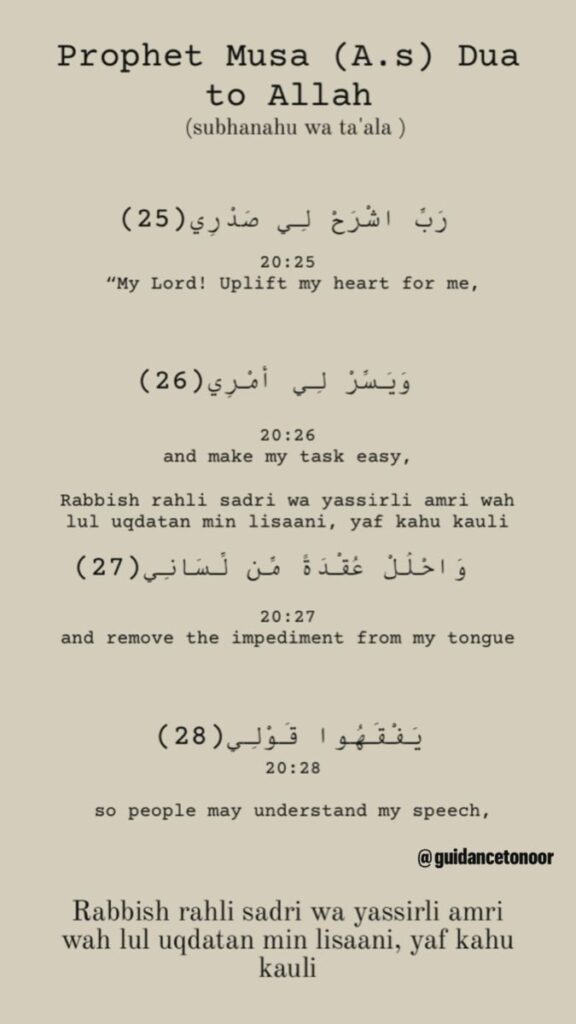
At that moment, Musa (AS) turned to Allah with humility and made this sincere dua:
رَبِّ اشْرَحْ لِي صَدْرِي وَيَسِّرْ لِي أَمْرِي وَاحْلُلْ عُقْدَةً مِنْ لِسَانِي يَفْقَهُوا قَوْلِي
“My Lord, expand for me my breast [with assurance], and ease for me my task, and untie the knot from my tongue that they may understand my speech.”
— Surah Taha, 20:25–28
This beautiful supplication reflects Musa’s complete trust in Allah. He asked for three things: confidence, ease, and clarity of speech—the qualities needed to fulfill his mission. Despite his fears, Musa (AS) did not hesitate or make excuses; instead, he sought Allah’s help to overcome his weaknesses and face Pharaoh with strength and faith.
According to some tafsir, Musa (AS) had a speech difficulty from childhood after an incident in Pharaoh’s palace. But rather than seeing it as a limitation, he acknowledged it before Allah and asked for His assistance. His dua shows us the power of humility and reliance on Allah: even prophets, though chosen, sought divine help for courage and success.
The story teaches that whenever we feel anxious, incapable, or fearful—whether it’s speaking in public, starting something new, or facing a challenge—we can make the same dua. True confidence and ease come only from Allah, who can turn fear into strength and difficulty into relief.
3. Dua for relief from worry and sadness
When distress and sadness weigh heavily on the heart, turning to Allah brings comfort and hope. The Prophet ﷺ taught a beautiful dua for those struggling with anxiety and sorrow:
اللَّهُمَّ إِنِّي أَعُوذُ بِكَ مِنَ الْهَمِّ وَالْحَزَنِ، وَأَعُوذُ بِكَ مِنَ الْعَجْزِ وَالْكَسَلِ، وَأَعُوذُ بِكَ مِنَ الْجُبْنِ وَالْبُخْلِ، وَأَعُوذُ بِكَ مِنْ غَلَبَةِ الدَّيْنِ وَقَهْرِ الرِّجَالِ
“O Allah, I seek refuge in You from worry and grief, from weakness and laziness, from cowardice and miserliness, and from being overcome by debt and by men.”
(Sahih al-Bukhari)
This dua reminds believers that relief comes not from escaping trials, but through seeking refuge in the One who controls all affairs.
4. Dua to Ask Allah for Help for Guidance When Facing Confusion
Life often presents moments of uncertainty and doubt. During such times, believers seek Allah’s guidance to make the right decisions:
اللَّهُمَّ اهْدِنِي لِمَا اخْتُلِفَ فِيهِ مِنَ الْحَقِّ بِإِذْنِكَ، إِنَّكَ تَهْدِي مَن تَشَاءُ إِلَى صِرَاطٍ مُّسْتَقِيمٍ
“O Allah, guide me, by Your permission, to the truth concerning that wherein people differ, for You guide whom You will to a straight path.”
This dua nurtures clarity, wisdom, and trust in Allah’s perfect knowledge—especially when one feels lost or unsure about a choice.
5. Dua for strength and patience
Patience (sabr) is one of the greatest virtues in Islam, and true strength comes from Allah alone. When the heart feels weak, believers can recite:
رَبَّنَا أَفْرِغْ عَلَيْنَا صَبْرًا وَثَبِّتْ أَقْدَامَنَا وَانصُرْنَا عَلَى الْقَوْمِ الْكَافِرِينَ
“Our Lord, pour upon us patience and make our feet firm and grant us victory over the disbelieving people.”
— Surah Al-Baqarah, 2:250
This dua was made by the believers in battle, showing that patience is not passive endurance—it is strength through faith and perseverance.
6. Dua to Ask Allah for Help for Protection from Harm
Seeking Allah’s protection guards a believer from seen and unseen dangers. The Prophet ﷺ used to say morning and evening:
بِسْمِ اللَّهِ الَّذِي لَا يَضُرُّ مَعَ اسْمِهِ شَيْءٌ فِي الْأَرْضِ وَلَا فِي السَّمَاءِ وَهُوَ السَّمِيعُ الْعَلِيمُ
“In the name of Allah, with whose name nothing on earth or in the heavens can cause harm, and He is the All-Hearing, All-Knowing.”
(Abu Dawood, Tirmidhi)
This dua builds spiritual peace and reassurance, reminding believers that ultimate safety lies in Allah’s protection.
7. Dua for success in challenges
True success is not merely achieving worldly goals—it is succeeding with Allah’s blessing and guidance. When facing challenges, this dua reflects sincerity and humility:
رَبِّ أَدْخِلْنِي مُدْخَلَ صِدْقٍ وَأَخْرِجْنِي مُخْرَجَ صِدْقٍ وَاجْعَل لِّي مِن لَّدُنكَ سُلْطَانًا نَّصِيرًا
“My Lord, cause me to enter a sound entrance and to exit a sound exit and grant me from Yourself a supporting authority.”
— Surah Al-Isra, 17:80
This supplication reflects trust that every beginning and ending, every effort and outcome, rests in Allah’s hands.
Final Thoughts
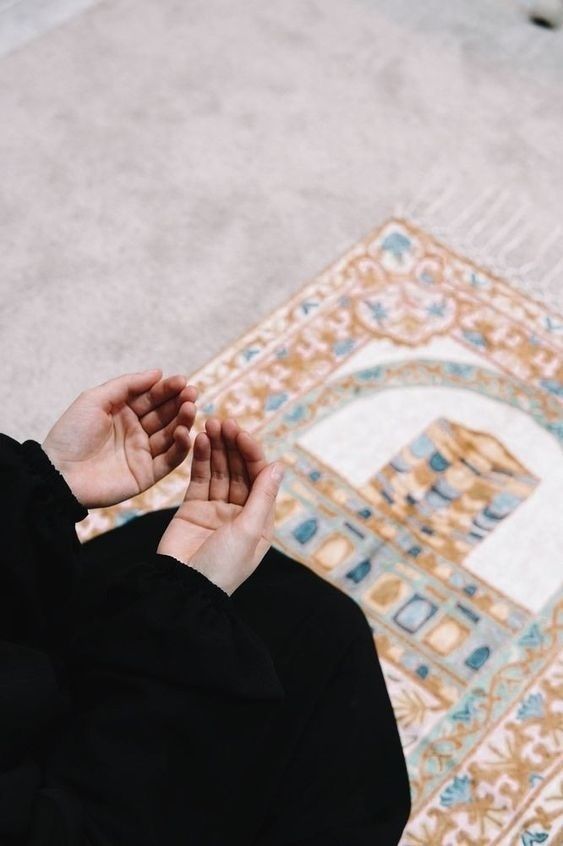
Turning to Allah through dua to ask Allah for help is one of the most beautiful ways to strengthen your faith and find peace amidst life’s challenges. Every time you raise your hands and call upon Him, you’re not just asking — you’re connecting with the One who knows your heart better than anyone else. Whether in moments of ease or distress, dua reminds you that you’re never alone; Allah’s mercy and support are always near.
So the next time you face worry, fear, or uncertainty — pause, breathe, and call upon Him sincerely. Your dua might not change your situation instantly, but it will surely change you — your heart, your patience, and your trust in Allah’s perfect plan.
Ready to Deepen Your Connection with the Quran?
At Areeb Academy, we help students around the world understand, memorize, and live by the Quran.
✨ Join our courses in:
- Tafseer (Quran Explanation) for Kids & Adults
- Quran Memorization with Tajweed for Kids & Adults
- Islamic Studies for Kids & Adults
Learn with qualified teachers, flexible schedules, and personalized 1-on-1 classes designed to nurture both knowledge and spirituality.
💬 Start your journey today — book a FREE trial lesson now!
❓ Frequently Asked Questions (FAQs)
1. What is the best time to make dua to ask Allah for help?
Some of the best times include the last third of the night, during sujood (prostration), between the adhan and iqamah, while fasting, and on the Day of Arafah.
2. Can I make dua in my own language?
Yes! Allah understands every language and even the thoughts of your heart. Dua is about sincerity, not formality.
3. What if I don’t see my dua being answered?
Your dua is always answered — either by giving you what you asked for, protecting you from harm, or saving it for you in the Hereafter. Keep trusting Allah’s timing.
4. How can I make my dua more powerful?
Start with praising Allah, send blessings upon the Prophet ﷺ, and ask with humility, consistency, and full trust that Allah hears you.


